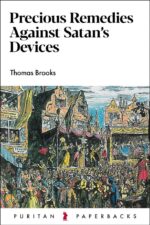save
$1.49Remedios Preciosos, Contra las Artimanas de Satanas (Thomas Brooks)
$11.50$12.99
La extraña oposición que sufrí de parte de Santanás realiza un mayor esfuerzo, al saber que Satanás lucha ferozmente por evitar que salgan a la luz aquellas cosas que pueden sacudir y derrotar su reino de tinieblas, engrandeciendo el Reino y la gloria del Señor Jesucristo en las almas y vidas de los hijos de los hombres {…}’. Esta es una de las siete razones por las que escribi el presente libro citadas por el autor, Thomas Brooks, en su prefacio.
Out of stock
Remedios Preciosos
Contra las Artimanas de Satanas
“La extraña oposición que sufrí de parte de Satanás realizar un mayor esfuerzo, al saber que Satanás lucha ferozmente por evitar que saigan a la luz aquellas cosas que pueden sacudir y derrotar su reino de tinieblas, engrandeciendo el Reino y la gloria del Señor Jesucristo en las almas y vidas de los hijos de los hombres”.
— Esta es una de las siete razones por las que escribir el presente libro citadas por el autor, Thomas Brooks, en su prefacio.
About the Author
Little is known about Thomas Brooks as a man, other than what we learn from his writings. Born in 1608, Brooks entered Emmanuel College, Cambridge in 1625. He was licensed as a preacher of the gospel by 1640 at the latest. Before that, he spent several years at sea, probably as a chaplain with the fleet. After the Civil War, Brooks became minister at Thomas Apostle’s, London, and was sufficiently renowned to be chosen as preacher before the House of Commons on 26 December, 1648.
Three or four years later he moved to St Margaret’s, Fish-street Hill, London, but encountered considerable opposition as he refused baptism and the Lord’s Supper to those clearly ‘unworthy’ of such privileges. The following years were filled with written and preaching ministry. In 1662 he fell victim to the notorious Act of Uniformity, but he appears to have remained in his parish and to have preached the Word as opportunity offered. Treatises continued to flow from his agile pen. In 1677 or 1678 he married for the second time, ‘she spring-young, he winter-old’. Two years later he went home to his Lord.










